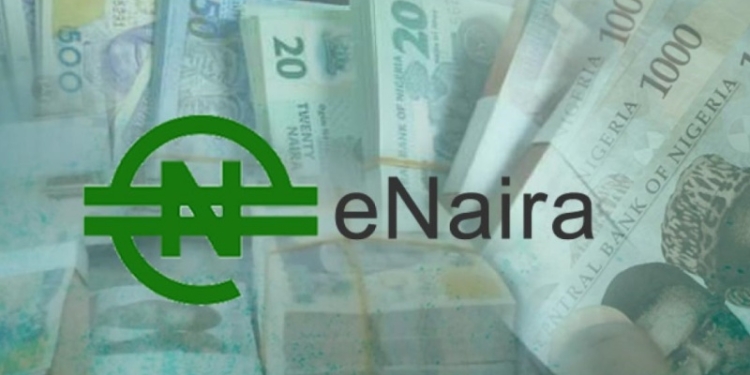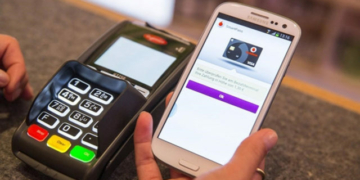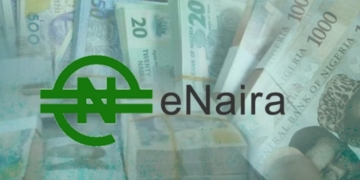- CBN introduced eNaira on October 25, 2021 following ban of cryptocurrency in Nigeria
- Three years after, Nigerians are yet to embrace the digital currency
- Poor infrastructure, weak technology are cited as the major challenges of the eNaira acceptance
On October 25, 2021, the Central Bank of Nigeria, CBN introduced eNaira. The eNaira is a Central bank digital currency issued and regulated by the Central Bank of Nigeria. Findings showed that it was the first of its type in Africa.
In any case, according to the Nigerian government under former president, Muhammadu Buhari, in 2021, during the launching eNaira was going to be pivotal and key to enabling more remittances and growing Nigeria’s economy.
The eNaira is a Central bank digital currency issued and regulated by the Central Bank of Nigeria. Hence it was the first of its type in Africa.
Denominated in naira, the eNaira serves as both a medium of exchange and a store of value and claims to offer better payment prospects in retail transactions when compared to cash.
Nevertheless, describing the eNaira launch, the International Monetary Fund (IMF), had noted that eNaira uses the same technology as Bitcoin and Ethereum and is stored in digital wallets which can be used for payment transactions.
The move to launch eNaira 2021 came few months after the country banned cryptocurrency trading by commercial banks in the country.
Nigeria had banned cryptocurrency trading in February 2021, which made the eNaira to ensure that digital currencies are still used for trading in the country.
There have, however, been concerns on the digital currency since its launch.
According to the United Nations outline, digital payments can help countries: to access essential services, grow their economies, be more competitive in the global economy, reduce inequalities and deliver essential services as well as foster social inclusion.
Enabling a digital payment currency or payment systems also helps to deepen the digital public infrastructure (DPI) in any country.
What is eNaira all about?
The eNaira is a digital currency similar to other digital currencies including, cryptocurrency, virtual currency, and central bank digital currency. A digital currency typically is any currency, money, or money-like asset that is primarily managed, stored, or exchanged on digital computer systems, especially over the internet.
One might wonder what are the benefits and basic features of the eNaira and if it is worth using in a country like Nigeria where government financial policies are oftentimes opaque and flippant.
The eNaira is meant to provide financial inclusion to the populace by making financial services available to people or communities who do not have enough banking opportunities. The eNaira basically eases transactions and offers digital stability, thus reducing the need for physical cash.
Again, the eNaira is meant to ease trade both locally and internationally by making financial transactions cheap, quick and better. Offline banking and payments with cash take time for processing but with the eNaira, the delay is eliminated. Nigerians in the diaspora can send money into Nigeria using the eNaira and earn some incentives for doing so.
More so, the eNaira has a unique identity and security feature which makes it secure and cannot be counterfeited, unlike the paper Naira.
Another thing you need to know about the eNaira is that it aids the revenue collection process since it reduces cash handling costs. Revenue collection agencies would find this very useful in their line of work.
Unlike cryptocurrencies that have no government institutional backing, the eNaira is backed by the government and is pegged against the traditional Naira. It will not fluctuate due to market influence at a different rate from the traditional Naira. Thus 1 eNaira is equivalent to N1.
The eNaira has transaction and balance limits for individual eNaira wallets imposed by the CBN:
For Tier 0, the daily transaction and balance speed wallet limits are N20,000.00 and N120,000.00, respectively.
For Tier 1, daily transaction and balance speed wallet limits are N50,000.00 and N300,000.00, respectively.
For Tier 2 customers, daily transaction and balance speed wallet limits are N200,000.00 and N500,000.00, respectively.
Finally, for Tier 3 customers, daily transaction and balance speed wallet limits are N1,000,000.00 and N5,000,000.00, respectively, while there isn’t any limit for Merchants.
The use of the eNaira comes with charges however, the CBN stipulates that while charges for transactions that originate from the eNaira platform shall be free for the first 90 days commencing from October 25, 2021, it would revert to applicable charges as outlined in the Guide to Charges by Banks Other Financial and Non-bank Financial Institutions.
Nigerians yet to embrace eNaira
Findings by WITHIN NIGERIA showed that as of March this year, the currency in circulation stood at N3.87 trillion, out of which CBN Digital currency (eNaira) stood at N13.8billion representing a merely 0.36% of the total currency in circulation.
According to findings by our reporter, one of the biggest challenges of eNaira is that cash is the prevailing method of transaction in Nigeria.
Hence there is fluctuation in the penetration of digital currencies meant to ease the use of cash as a mode of financial transaction.
In May 2023, the International Monetary Fund noted that 98.5% of the eNaira wallets were inactive.
Findings also showed that as of September 2024, the currency in circulation stood at N4.3 trillion out of which that which was outside the bank was estimated at N4 trillion representing 93% of the currency in circulation, which shows that Nigerians still prioritise cash as against Digital currencies.
Challenges of operation of eNaira
Technology infrastructure: further checks showed there is infrastructure deficit in the eNaira implementation. The Central Bank of Nigeria needs to ensure that a robust technology infrastructure is in place to manage the eNaira. This doesn’t appear to have been clearly thought out before the launch. In February 2023, it was announced that Nigeria was in talks with a new technology provider to develop a new system to run and manage the eNaira.
The original system was built by Bitt, a global financial technology company.
It is believed that the Central Bank of Nigeria wants to develop its own software for the digital currency. The new partner would help the central bank to control the underlying technology.
A change of the technology provider two years into the project suggests the country does not have the right programme for rolling out a robust system.
Training: The idea is that financial institutions would give users access to central bank digital currency wallets while the central bank oversees the ledger and manages the system. It is, however, reported that banks and financial institution staff do not appear well trained to get users on board. So the system is not fully ready for adoption.
Data privacy: Under the current design, the central bank will be able to see all transactions of users of the eNaira. Potential users are apprehensive about this and a solution is needed.
Prevention of financial crimes: A tiered mechanism is in place for the issuance of eNaira wallet, depending on the level of identification documentation users provide. Each tier has certain balance and transaction limits to prevent abuse of the system.
But this is likely to limit access for the people who need financial inclusion the most.
This is so as they are likely to find it difficult fulfilling the more stringent identification requirements needed for a larger transaction limit. Also, the eNaira design uses the existing Bank Verification Number and National Identity Number regime. Poorer people are likely to be challenged getting the documentation needed for this and it can be an expensive and cumbersome process.
As this system is currently only accessible to those with bank accounts, it does not facilitate financial inclusion.
Nigeria’s electricity and internet crisis: The electricity crisis and lack of widespread access to internet connectivity across the country, especially in rural communities, is a challenge. There would be a need for offline access to the eNaira platform.
Non-functional eNaira shortcode, Never-Arriving OTP
The activeness of the platforms created by the CBN for eNaira wallets use is also susceptible, for instance, a shortcode *997# was said to have been introduced for people without smartphones to create an eNaira wallet. However, checks by WITHIN NIGERIA as of Thursday is showed that the code was inactive.
If shortcodes do not work, it would mean those with access to smartphones may be the ones that may have the chance of using eNaira.
A GSMA report noted that 68% of Nigerians in rural areas lack access to smartphones as of 2022. Only 58% of persons in Urban areas own smartphones, technically only 45% of Nigerians have access to smartphones.





Discussion about this post